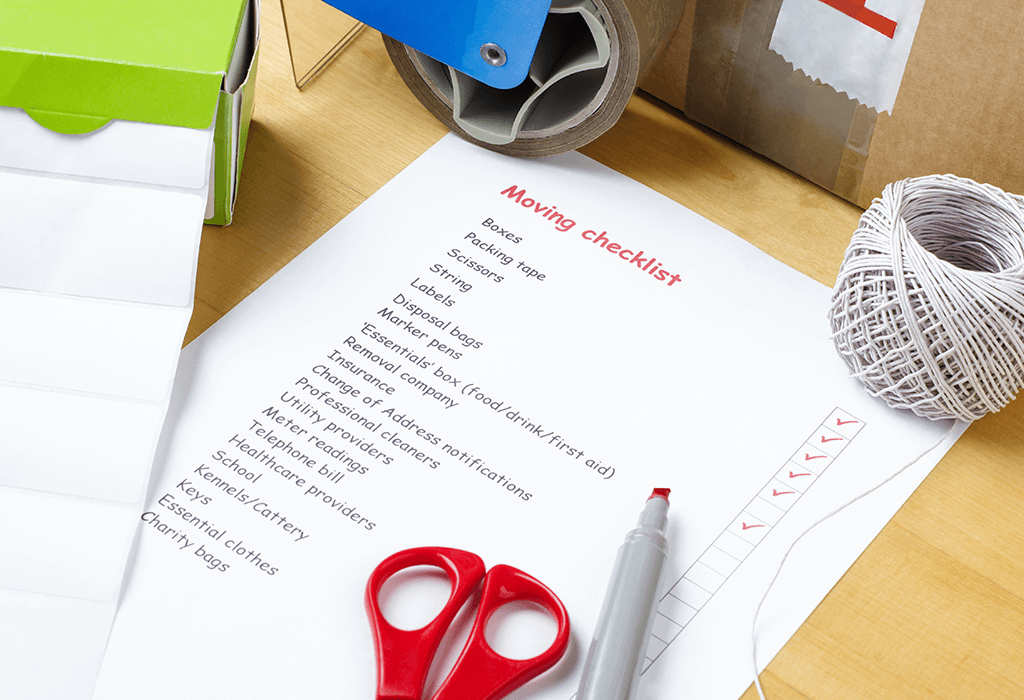Preparing to move can be easy for you and your family if you take some simple steps.
STEP 1: Plan and manage your relocation early.
Waiting until the last minute to pack your things often result in something you missed or misplaced or not sure whether you want to keep or a variety of things to decide when you should already be on your way!
To help you with your relocation, check out Connect Your Home’s convenient moving checklist template below to guide you through the moving process and keep you organized. The following template can be used as a moving checklist for apartment or house.
STEP 2: Organize Your Move
You’re moving to a new house or apartment. It’s a new beginning. And you know you have things you’ve been meaning to get rid of but never got around to it and they’re sitting in your garage, your closet, under your bed, in the backyard. We’re talking clutter and you don’t want to move clutter with you.
- House Cleaning – Ask yourself: What items do I rarely use now that I won’t use in my new home? Create a moving checklist by room.
- Pack Your Essentials: Bedding, linens, clothes, bathroom necessities (toothbrushes, toothpastes, wash cloths, bathrobes, toiletries, hairdryer, hair care products, medications), first-aid kit, flashlights, pet supplies, cleaning supplies, paper towels, extension cords, batteries, light bulbs, trash bags, alarm clocks.
- As you pack all your necessities and separate items you won’t be taking with you, set them in the garage and hold an impromptu garage sale.
- If you’re in the giving mood, donate your unwanted items to your favorite charity or drop them off at a Goodwill or Salvation Army location.
- Take Inventory – Review the essentials and other items you’ve decided to take with you.
- Protect your possessions and keep track of your belongings by making a list or taking photos when using professional movers.
- Label plastic trash bags and boxes accordingly by the room where the contents belong.
- Make sure you check off the list every item moved into your home.
- Be Safe and Take Precaution – Take precaution as you pack and know what NOT to pack to keep yourself and the rest of your belongings safe.
- Do NOT pack anything flammable including lighter fluid, motor oil, paint thinner, turpentine, fuel canisters, aerosols, pesticide.
- Do NOT pack personal items of irreplaceable value including cash, jewelry, sentimental items, papers, documents and mail with sensitive information.
- Be extra careful with heat-sensitive items including CDs/DVDs, computer hardware and peripherals, and laptops.
- If you cannot move live plants yourself carefully, pack plants in a way that secures the base and provides room for branches. Pack it last and unpack it first and provide water and partial sunlight (as needed for the plant type). Generally movers will not move live plants in a truck or pod.
- For cross country moves be aware of state laws that restrict certain plants (ie California). Check online for information on restricted plant types.
- Whether you decide to do the moving of larger items yourself or hire professional movers, make sure you clear all obstructions including rugs, door mats, low-hanging items, and any other obstacles to create a clear path.
- Always let professional movers know beforehand about items that require special handling especially items with loose, detachable, or mended parts.
- Moving – Will you be doing the moving yourself or do you need professional movers?
- Make sure to weigh the pros and cons between doing the moving yourself or hiring professional movers including the estimated cost, distance of the move, the moving of large/heavy items, and the search for a quality moving company.
- For those taking the DIY approach, make sure to ask and schedule time for family or friends to help with your move. Do you need to rent a moving truck?
- If you decide to use professional movers, give yourself at least 2 months in advance to do research and read referrals to help ensure you picked the right movers.
- Arrange for Transfer of Your Home Services and Utilities – Notify your current home service and utility providers of your relocation.
- Be sure to contact the following home services and utilities: electricity, water/sewer, gas, home security systems, home phone service, internet service, cable or satellite television service, and trash or recycling pickup.
- Check to make sure your cable TV and internet service provider is available in your new area. Use our Home Services Search Form to find all available home services in your new area.
-
If you need new home services for your new home, Connect Your Home can help you find the right cable or satellite TV, high speed internet, home phone, home security and more.

